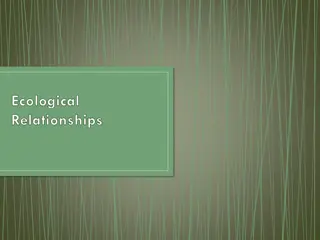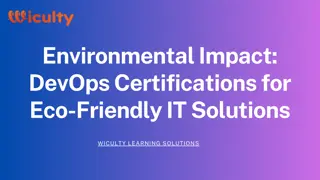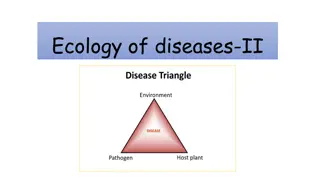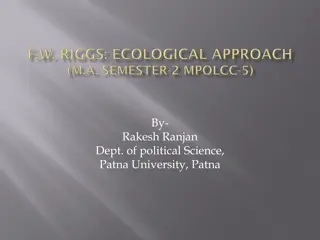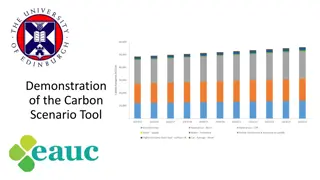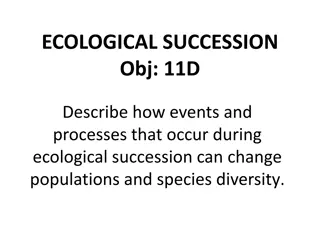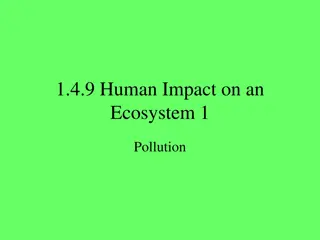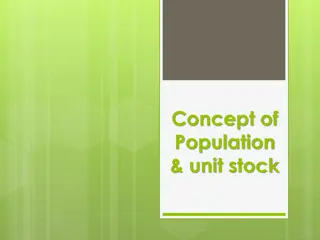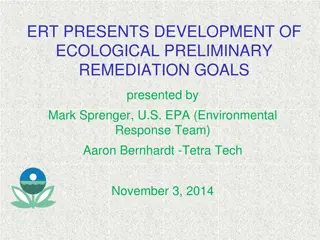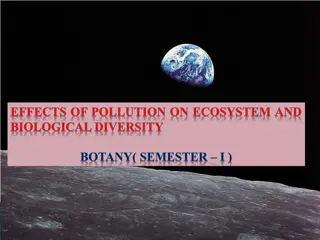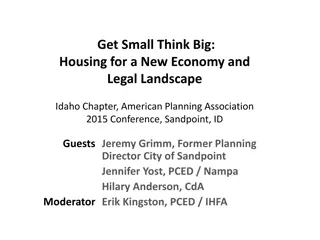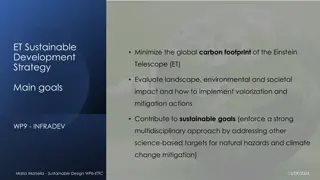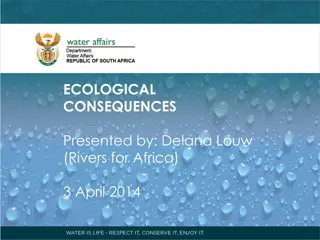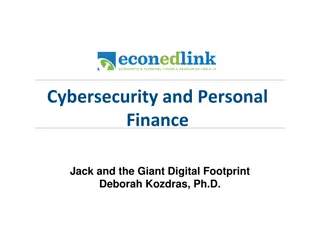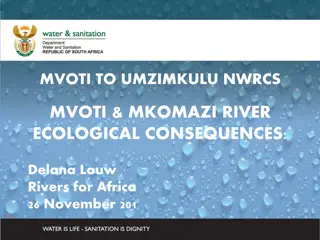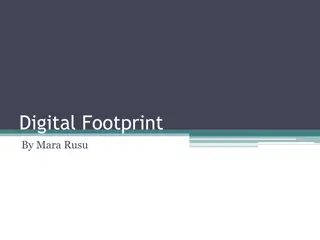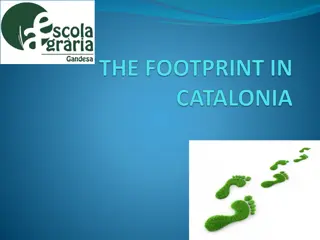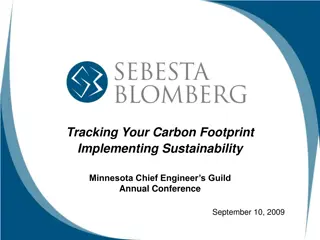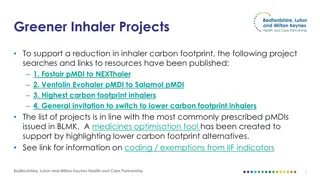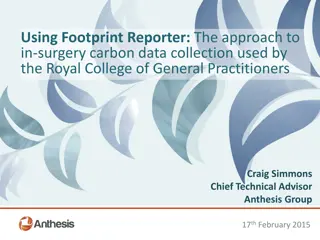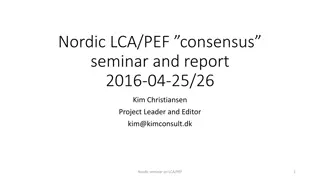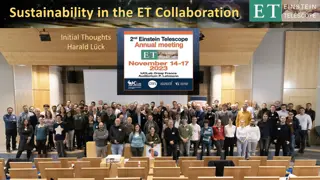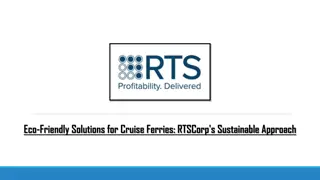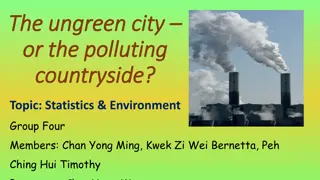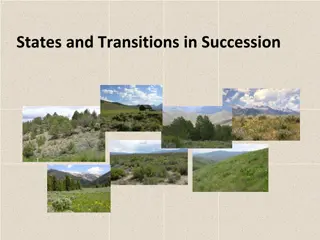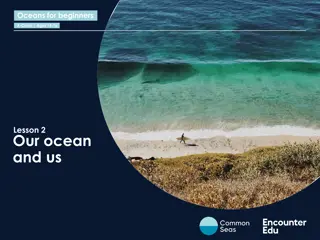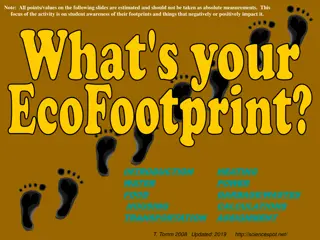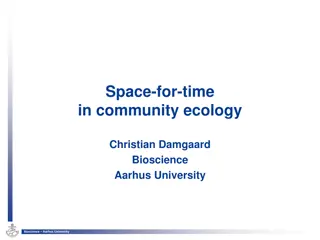Understanding Models with False Positive Detections in Occupancy Modeling
Explore the importance of addressing false positives in occupancy modeling, potential biases caused by them, methods to mitigate errors, and the extension of basic occupancy models to allow for false positives. Key concepts such as the Royle-Link model and the integration of classification processes
10 views • 33 slides
Overview of Ecological Studies in Epidemiology
Ecological studies in epidemiology involve studying groups of individuals at a population level to examine the correlation between exposure and disease occurrence. While cost-effective and useful for generating hypotheses, ecological studies have limitations, such as the inability to control for con
3 views • 21 slides
Understanding Ecological Relationships and Food Chains
Explore the intricate ecological relationships in nature, including population dynamics, producer-consumer systems, and different types of consumers like herbivores, carnivores, and decomposers. Learn about food chains, food webs, and the interconnectedness of organisms in ecosystems through informa
0 views • 38 slides
Environmental Impact DevOps Certifications for Eco-Friendly IT Solutions
The intersection of DevOps and environmental sustainability presents a unique opportunity for organizations to reduce their ecological footprint while enhancing operational efficiency. DevOps certifications are a crucial step in this journey, providi
0 views • 9 slides
Understanding Ecosystems and Disease Ecology
Explore the diverse types of ecosystems, including autochthonous, anthropurgic, and synanthropic ecosystems, and their impact on disease ecology. Learn about biotopes, biocenosis, ecological mosaics, and ecological interfaces, and discover how infectious diseases can be transmitted across these inte
0 views • 10 slides
Understanding Landscape Architecture: Designing Outdoor Environments
Landscape architecture involves the art and practice of designing outdoor spaces to harmonize with buildings, roads, and natural surroundings. It is a comprehensive discipline that encompasses land analysis, planning, design, management, and preservation, creating healthy and enjoyable spaces for th
1 views • 23 slides
The Ecological Approach in Comparative Public Administration
Fred W. Riggs, a proponent of the Ecological Approach in Public Administration, emphasized the importance of understanding the interaction between administrative systems and their external surroundings. He introduced the Fused-Prismatic-Diffracted Model to explore the unique contexts of developing c
0 views • 21 slides
Understanding the Carbon Scenario Tool for Climate Change Management
The Carbon Scenario Tool (CST) is a valuable resource developed by the University of Edinburgh and the Scottish Funding Council to manage, report, and forecast carbon emissions for university estates and operations. It enables the calculation of the impact of carbon reduction projects and the develo
2 views • 18 slides
Understanding Ecological Succession and Its Impacts
Ecological succession is the orderly process of change in an ecosystem, where one community replaces another until a stable climax is reached. This progression affects populations and species diversity. The process involves primary and secondary succession, with events like tornadoes, hurricanes, an
0 views • 23 slides
Understanding Pollution and its Ecological Impact
Pollution is any human addition to the environment that disrupts the ecosystem's ability to sustain life. This includes pollutants like CO2 and chemicals from various sources that harm air, water, and land. Different types of pollution such as industrial, agricultural, and domestic pollution have ad
0 views • 25 slides
Understanding the Relationship Between Ecology and Business
Ecology and business have a complex relationship where human activities impact the ecological environment, and in turn, the environment influences our quality of life. Maintaining ecological balance is crucial for sustainable development, and businesses play a significant role in ensuring environmen
0 views • 19 slides
Understanding Ecological Niches in Advanced Biology
In Advanced Higher Biology, the concept of ecological niches is explored in depth, considering both abiotic and biotic factors that impact an organism's role in its environment. The fundamental and realized niches are distinguished, along with the Competitive Exclusion Principle and examples like sq
4 views • 18 slides
Understanding the Concept of Population and Unit Stock
The concept of population revolves around all organisms of the same species living in a specific area capable of interbreeding. It is essential to differentiate between sample populations and real populations to accurately study their attributes such as birth rates, death rates, and spatial dimensio
0 views • 15 slides
Eco-Remediation Goals Development Training Overview
This presentation by Mark Sprenger from the U.S. EPA discusses the development of Ecological Preliminary Remediation Goals (PRGs). It covers the process steps, assumptions, risk information activities, and resources related to ecological risk assessment within the EPA's programs. The training module
0 views • 53 slides
Understanding the Ecological Impact of Food Production and Consumption in Greece
Our food comes from various sources, and it's essential to consider its ecological footprint on the environment. Through research conducted by the 27th Primary School of Trikala, Thessaly, Greece, valuable insights were gained about the origin and buying preferences of Greek families regarding food.
0 views • 31 slides
Understanding Biological Diversity and Ecological Organization
Exploring the intricate balance of flora and fauna on our planet, this content delves into the vast array of plant and animal species coexisting in various ecosystems. It discusses the significance of biodiversity, the interaction of biotic and abiotic components in ecological systems, and the ecolo
0 views • 41 slides
Exploring Small-Footprint Housing in a New Economy
This presentation at the 2015 American Planning Association Conference in Sandpoint, ID, delved into the significance of small-footprint housing in addressing diverse market demands and economic factors. The discussions covered various models like Conestoga Huts and Tiny Houses on Wheels, highlighti
0 views • 26 slides
ET Sustainable Development Strategy: Minimizing Global Carbon Footprint
In the pursuit of sustainable development, the Einstein Telescope (ET) is focusing on minimizing its global carbon footprint. Maria Marsella leads the efforts to evaluate the environmental, societal, and landscape impacts of this strategy, aiming to implement valorization and mitigation actions. By
1 views • 8 slides
Understanding Ecological Consequences in Ecosystem Management
Delana Louw from Rivers for Africa presented on the ecological consequences of various scenarios in ecosystem management. The process involves delineating units of analysis, stakeholder engagement, quantifying ecological water requirements, evaluating scenarios, and determining management classes. B
0 views • 14 slides
Jack and the Giant Digital Footprint - Cybersecurity and Personal Finance
Explore the tale of Jack and the Giant in the digital age, where Jack faces potential risks due to his online activities and the lurking threat of a giant discovering his house. As Jack navigates the implications of his digital footprint, he seeks guidance on safeguarding his online presence to prot
0 views • 15 slides
Ecological Consequences Assessment for Conservation Areas
Determining the ecological consequences of various scenarios is crucial for conservation efforts. The assessment focuses on changes in geomorphology, physico-chemical properties, fish populations, macroinvertebrates, and riparian vegetation. By evaluating scenarios based on ecological significance,
0 views • 11 slides
Understanding Your Digital Footprint: Impact and Importance
Your digital footprint can have significant implications on your personal and professional life. From affecting job opportunities to how you interact online, this article explores the importance of managing your online presence. Learn practical tips to maintain a positive and safe digital footprint
0 views • 5 slides
Understanding the Impact of Your Digital Footprint
Your digital footprint plays a crucial role in shaping your future opportunities. What you post online can have both positive and negative implications on your career and personal life. It's important to be mindful of what you share online and take steps to keep your digital footprint clean to safeg
0 views • 10 slides
Understanding Ecological Footprint: A Vital Sustainability Indicator
The ecological footprint measures the productive land and sea surfaces needed to support a country's resource consumption and waste generation. It informs the surface area required to renew resources used and emphasizes the importance of sustainable practices for a balanced ecosystem.
0 views • 24 slides
Understanding Carbon Footprint and Implementing Sustainability
Explore the concept of carbon footprint, sustainability, and practical solutions to achieve environmental goals. Learn how to calculate greenhouse gas emissions, identify sources, and take steps towards a more sustainable future. The challenges of weight loss and budget tightening are analogously pr
0 views • 19 slides
Greener Inhaler Projects for Reduced Carbon Footprint
Projects promoting a reduction in inhaler carbon footprint have been initiated, focusing on switching to lower carbon footprint inhalers like Fostair pMDI to NEXThaler and Ventolin Evohaler pMDI to Salamol pMDI. The projects aim to highlight alternatives with lower environmental impact and provide r
0 views • 6 slides
In-Surgery Carbon Data Collection with Footprint Reporter
Anthesis, specializing in sustainability, customized the Footprint Reporter software for the Royal College of GPs in 2011, enabling GP surgeries to easily capture their carbon footprint. The tool covers key emission areas following Defra guidelines and offers a user-friendly interface, instant analy
0 views • 9 slides
Understanding Your Digital Footprint for Effective Online Presence
Delve into the concept of digital footprint to comprehend the impact of your online activities. Explore the significance of managing and being aware of the data trail you leave behind on the internet. Learn how this awareness can influence your online behavior positively, guiding you to be mindful o
0 views • 9 slides
Nordic LCA/PEF Consensus Seminar and Report 2016: Insights and Progress
Nordic Environmental Footprint Group (NEF) is a key Nordic authority cooperation group under the Nordic Council of Ministers dedicated to discussing and exchanging viewpoints on EU Commission testing and uses of Product and Organizational Environmental Footprint. Through workshops and seminars, NEF
0 views • 16 slides
Optimizing Contract Manufacturing Footprint: A Case Study
Highlighting opportunities to optimize a client's manufacturing footprint, this case study delves into the process of evaluating outsourcing options, selecting partners, and strategizing for cost efficiency and production effectiveness. By following a comprehensive approach, the case study showcases
0 views • 13 slides
Taking the First Steps to Reduce Business Carbon Footprint
Initiating efforts to reduce business carbon footprint involves identifying emission sources, analyzing energy consumption, and implementing strategies to measure and track emissions. This involves understanding where emissions originate from, gaining insights into the numbers through consumption da
0 views • 21 slides
Sustainability Challenges in ET Collaboration: Addressing Ecological and Non-Ecological Aspects
The ET Collaboration is realizing the importance of sustainability, encompassing ecological and non-ecological aspects. Issues include balancing energy consumption and hardware longevity, remote access possibilities, funding sustainability, social partnerships, and designing instruments with sustain
0 views • 5 slides
Eco-Friendly Solutions for Cruise Ferries RTSCorp's Sustainable Approach
As the world grapples with climate change, industries are turning to sustainable solutions to reduce their environmental footprint. The cruise industry, long known for its substantial carbon emissions and ecological impact, is no exception. One key p
0 views • 6 slides
Impact of Urban and Rural Areas on Environmental Pollution
Exploring the impact of urban and rural areas on environmental pollution, this discussion delves into the misconception that urban dwellers have a lesser impact on the environment compared to rural residents. Through statistics, findings, and ecological footprint evaluations, the presentation sheds
0 views • 30 slides
Understanding Plant Community Succession and Ecological Transitions
Explore the dynamic process of plant community succession, from pioneer stages to climax communities, and the intricate patterns of transitions in ecological systems. Discover the variability and stability of different states within ecosystems, highlighting the complexities of natural ecological dyn
0 views • 14 slides
Understanding and Safeguarding Your Digital Footprint
Strategies to maintain a safe digital footprint include thinking before posting, considering timing, and being mindful of others' perceptions. Sharing positive content on social media is advised to avoid negative impacts on future opportunities. Your digital footprint can significantly influence emp
0 views • 5 slides
Understanding Ecological Goods and Services from Our Oceans
Explore the importance of ecological goods and services provided by oceans in Lesson 2 of the Oceans for Beginners curriculum. Learn about the tangible products, benefits, and services derived from ocean ecosystems, and reflect on their significance. Understand the categories of ecological services
0 views • 15 slides
EcoFootprint Awareness Activity for Students
Engage students in an EcoFootprint awareness activity to understand their impact on the environment through water, food, housing, transportation, and other aspects. By answering questions and calculating points, students can assess their ecological footprint and identify areas for improvement in the
0 views • 13 slides
Understanding Space-for-Time Substitution in Community Ecology
Space-for-time substitution (SFT) is a method used to study slow ecological processes by assuming different sites are at various stages of development. This approach, famous for its role in ecological development, has been critiqued for its implicit use in testing hypotheses on ecological processes
0 views • 7 slides
Energy-Saving Carbon Footprint Savings through Wall Insulation toward 2025
Reduce your carbon footprint and energy bills with wall insulation. Explore types of insulation, calculate potential savings, and learn about proper installation for maximum benefit.\n\n
1 views • 3 slides


